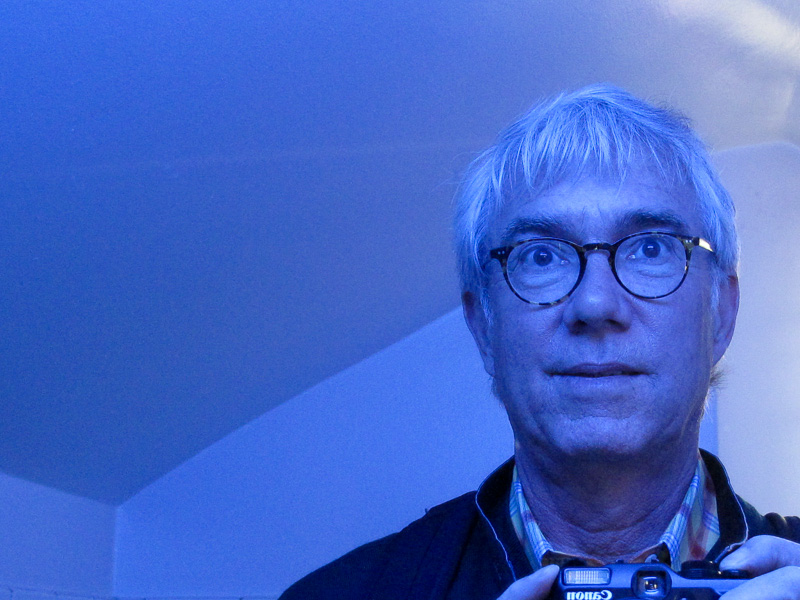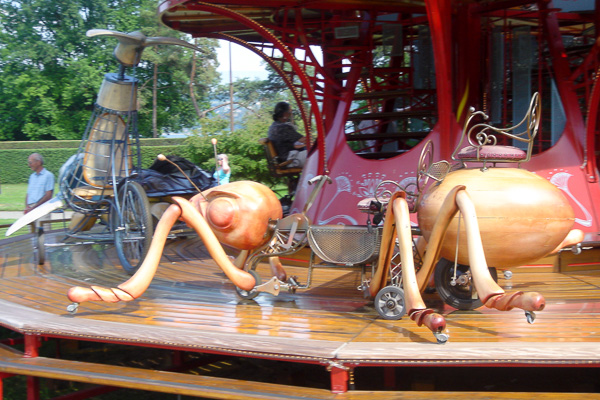I’ll start with my latest painting, “Bugs and Stars.”

“Bugs and Stars” acrylic, July, 2017, 24” x 18”. Click for a larger version of the painting.
I did this one pretty quickly. I used the background color from my recent “Monkeybrains ISP,” wrapping the pale blue-green around some purplish blobs. I added some strands of grass, and a bunch of bugs. The dots further back, they could either be bugs or they could be stars. How it is. More info at my paintings page.

…music that channeled the sounds of the cold midcontinental cities where it was born, cities of forgotten American diasporas hidden in the old roads and abandoned train stations. Chicago, Detroit, here in the Twin Cities.
Today’s post is, as with Walkaway last week, based on a new political SF book that I just read. This time it’s Christopher Brown, Tropic of Kansas. Filled with the music of Pynchon, Burroughs, and Ballard. And something of a dystopia. Chris has written an essay pointing out that, if you’re paying attention, the dystopia is already here.
I’m setting off quotes from Tropic of Kansas as blockquotes with a bar on the left side. And, as is my custom, the illos are whatever random-ass unused images I have kicking around. The older ones are smaller.

[Rudy and Chris at Borderlands 2017. Photo by G.I.L.L.Y.]
Sylvia and I went up to Borderlands Books in SF and saw Chris talking about his novel, and today I just finished reading it on my Kindle, it’s very political, a real rabble-rousing action tale. It’s been getting into my head, affecting the way I hear and see.
Chris is a charming guy from Austin, TX, maybe 50 years old, a lawyer, author of numerous fantasy stories, and this is his first novel. We had dinner with him after his Borderlands reading, and Michael Blumlein, and Joseph & Rina of Tachyon Books, and, out of the blue, my Night Shade editor Jeremy Lassen, who was at Borderlands too.

I saw the chemical silos where the yields of fouled fields are turned into food for machines.
Quick flash of pushing the gasohol thing to it’s logical conclusion. Corn you can’t actually eat. But it makes sick juice for running machines. Military agribiz eats the heart of America, the Tropic of Kansas.

The copter did not look like a helicopter. It looked like a flying ball made out of toothpicks. It was smaller than a basketball but bigger than a baseball. The balsa wood lattice was dotted with little fiber eyes all attached to a controller the size of a pack of gum. It had six small rotors inside the superstructure. It made no more noise than a fan. Like the plane, it did not look like it could fly. And it didn’t. More like it floated.
Nice futuristic eyeball kicks throughout the book. Almost like a videogame or a graphic novel at times. Most of the machines are evil. And the drones…they’re like a plague. Just like in Cory Doctorow’s Walkaway.

The screen was filled with a test pattern, made from a cartoon of a robot armadillo, its plates painted in the colors of the rainbow, standing on a logo. “Channel Zero Please Stand By”
From the outside, the place looked like a concrete bunker, marked with a painting by the door of a cheesecake Aztec princess remotely piloting a giant flying snake with a fleshy joystick.
Ah, the armadillos of Austin. There’s a nice cross-border and interracial feel to Tropic of Kansas. At the reading, Michael Blumlein kind of jokingly asked Chris if the book had any relation to sex in Paris, as in Miller’s Tropic of Cancer, and Chris was like, huh? The name has been repo-ed, refurbished, and reified.

…the modern highways tracked the old unpaved routes. The pioneers got the trails from Indians, who got them from the animals. Up north, some of the trails were so old they were said to have been the trackways of mastodons, the hippie-haired giant elephants that the first peoples followed over here from Siberia.
Love this rap. Our highways as mastodon trails. Yeah Deep time. Shit happens, and the wind blows it all away. Can we relax? Even while the pigs are trampling our constitution and civil rights with their filthy trotters? Gotta relax if you get a minute to yourself. Otherwise they’ve won all the way down to the bare metal. Shall we laugh or shall we cry? Utopia or dystopia or stone-cold all around freak show. Am I woke yet?

“The rising race is all rhizomatic,” crackled the voice inside the machine. “Grown strong from underground roots that connect us with each other, across socially constructed divisions, in ways our oppressors cannot see.”
Rhizome is a Bruce Sterling word. It’s that rootlike thing that a creeping plant can grow from. Like bamboo has rhizomes. Chris and Bruce are pretty tight, being Austinites. There’s even an old guy in Tropic who reminds me of Bruce, a wheeler-dealer called Walker, who runs a pirate TV station. (Although Chris says he didn’t necessarily intend a similarity.)

Sig drank his fourth can of beer. It tasted like cold white bread. He could feel the chill wash over the folds of his brain.
English guy at a hacker convention once says to me: “Why is making love in a canoe like Bud Light?” Answer: “They’re both f*cking close to water.” A brain made of folded Wonder bread. With mold in it, man. And the mold is the postsingular mind. Rhizomatic.

Time got slippery. It was like the moon slowed down and watched.
Some nice touches of that in here, but never overdone. I think Chris thought about this book for a long time. A lifetime’s brain dump. Can you see Australia in the sky in that picture? The blue part. Figure / ground. Yin / yang. Dystopia / Eutopia. Clouds before sun.
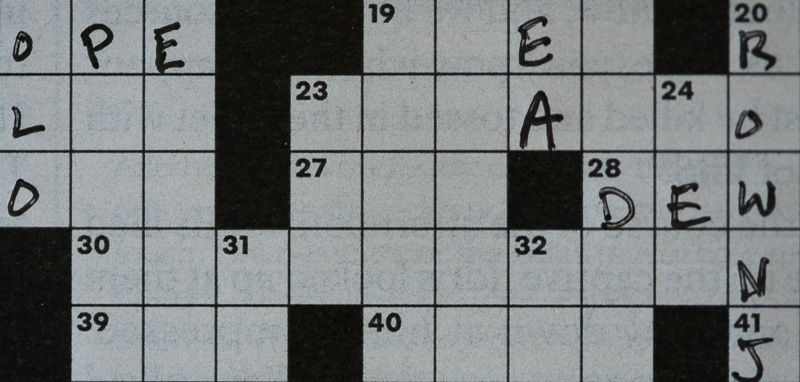
Ground crew were loading shrink-wrapped white metal boxes the size of refrigerators into the back bay of the jet. “What are those things?” asked Dallas. “Beats me,” said Clint. “Maybe some kind of office computers?” “They’re voting machines,” said Xelina. “Offshore-modified, special order. Bringing them in for the midterms. Time to elect a new Congress.”
Later they refer to these rigged voting machines as “Freedom Machines.” So very close to where we’re at right now.
Reading Tropic of Kansas and then turning to the daily report on what our self-styled President has recently tweeted, I feel so very amped up for protest. Bursting. I think would feel good to write a hard-core rabble-rousing political novel. This seems to be a good time for that, historically speaking. But, um, I’m writing a historical SF novel called Return to the Hollow Earth. I want to be inside. “I want to look like Mr. Bulber,” as the shapeshifting alien says in Secret of Life. Barely subhuman.
On the one hand, current-events novels don’t age well. On the other hand, sometimes it doesn’t matter how a novel “ages.” Sometimes it matters what the novel does right now.
And political novels can in fact last. Look at 1984 and Clockwork Orange and Man in the High Castle and The Trial. The SF move let’s you scootch it back from too close a connection to the fleeting details of the current tussle. Gets you some distance, SF does, as Gibson likes to say.

My Mathematicians in Love had a political flavor, written in G.W.Bush years, and so did my Postsingular diptych. Not that anyone seemed to pick up on it. But, who knows, maybe some seeds were sown. Hard to assess the effect of things that SF writers say.
Later into the Bush-Cheney years, I got to a rage-point of writing the most radical story I could think of, called “The Third Bomb.” Pretty much needed to self-pub that bad boy, and it was in my zine Flurb. Tropic of Kansas is at about that same intensity level, and maybe “they” wouldn’t have published it a few years ago. But with our government collapsing—like, why even pretend to be normal? Say anything. And thanks for saying it, Chris.
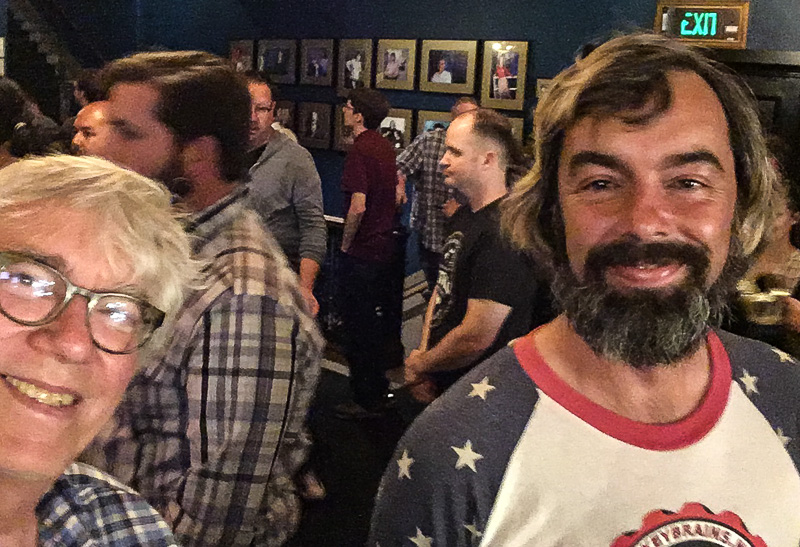
[Rudy and Rudy Jr seeing Mystery Science Theater 3000 live at the Warfield.]
[Watching analog Channel 0.] After the last lingering shot of blood on the dock, the screen went to a test pattern and then to a primitive animation. A robot armadillo waddled into view, stood up, and peeled back an armored hatch in his belly, revealing a television screen. Rabbit ear antennae came out from behind his ears. “Change the channel!” he said in a cartoon voice.
Something I really really dig about Tropic is how Chris plays with alternate forms of an undernet or dark net…instead of being digital, it’s at least party analog, using the now-banned old analog UHF TVs and old analog phones, He uses the trope of having secret signal data inside the dark bar that you used to see at the top of a TV image when it lost its “vertical hold” and started rolling.
I remember a story where there was a brief beep at the start of space-radio-transmissions, and the beep held the data of all time yet to come. James Blish story, maybe it was called Beep. But back to Tropic, it’s refreshing to have all this sprawling cruddy hacker equipment cobbled together instead of that James Bond microdot stuff.

[“Skunk” mercenaries in Louisiana.] One dude was sitting up on the cab in ballistic overalls, smoking a cigarette. He wore a necklace of animal tails and strips of hairy leather. An assault rifle half-covered in duct tape hung down along his thigh on a low-slung shoulder strap. He caught Sig looking at him and pointed at Sig with a finger gun and a fucked-up smile.
Love seeing guys like this in a story. So cyberpunk.
Normally I like sunny and sense-of-wonder. I’m looking for escape a lot of the time. I’ve always wanted to see politics wither away, rather than becoming even more central. But there is the temptation to write a story where some aethereal beings that simply executes every single Republican oppressor. Of course the French-revolution-type “off with their heads” strategy never ends well. It runs wild, turns against the splinter groups within the revolutionary party, and provokes Draconian retaliation from the enemies.
Could revolutionaries do something other than killing the pigs? Dial up their empathy? Allay their fears? Give them prophetic dreams? Group hugs instead of the guillotine? That’s something Cory Doctorow is reaching for in Walkaway. And it’s cool to layer Walkaway and Tropic of Kansas. Great to have these two books coming out in this same fiftieth Summer of Love 2017. Compare and contrast. Blow your mind. Sf lives.

Sig watched the shadow of the antennae slowly work its way across the street. The container smelled like the sea. He drifted into a dream of water. The big cold lake of the north, surface like glass, as still in the morning as a block of ice about to form.
Love that closely observed nature writing. The divinity of the physical world. Cranking at an inconceivably maxxed out flop. Flip. The spirit is in the woods. I went and got lost in the woods the other days. Wondering if I’d fall and break my leg. Worth it to be out there. Being lost in the woods is my victory condition.

“Is that your victory condition, honey?” said Walker. “Restore the Tchoupitoulas Autonomous Zone? Those nutjobs fucked things up so bad, people couldn’t even get a roll of toilet paper at the corner store, to say nothing of a decent steak.” “A new political system based on self-determination and real democracy doesn’t happen overnight,” said Xelina. “And a correction of predatory mercantilist monopolies takes even longer. The people are ready for free networks without bosses and rulers and the men with guns who serve them. The TAZ isn’t dead. It just went underground. And viral.”
Walker is the Sterlingesque guy I mentioned before. Bruce says “victory condition” a lot. And TAZ, that’s the “Temporary Autonomous Zone” concept from Peter Lamborn Wilson, aka Hakim Bey, you can find the book free on an anarchist site.
I love the name Xelina. Maybe it sounds like Helena? Rewrite Poe’s “To Helen” as “To Xelina”?

The Monsters Parade was the last volume in the series. A book so important to some that it caused sectarian arguments over whether the author meant for it to have an apostrophe in the title, and if so, where exactly it was supposed to go.
A nice thing in Tropic is that the prophet behind the movement is spacy woman sci-fi author, Maxine Price. Visionary sci-fi. Kind of a mix between P.K.Dick and Alice “James Tiptree” Sheldon.

Sig drew lines on his face with one of the cool charcoals from the edge of his fire. He had that feeling of machine surveillance, and a long open field to cross. The pattern was equal parts digital raccoon and pixel-hacking war paint. Xelina told him you could frustrate the facial recognition that way, a temporary version of the tattoos some guys got. “Neoprimitive augment,” she called it. “Improvise. Keep it irregular.”
Dig the real-punk hackeresque occupy type details. Are we going to need to go this far? Like these days, with Trump, for awhile I kept thinking, “This is going to do it. He’s out.” But nothing ever happens. We moan and rend our garments and the “rulers” keep on rooting. And each new outrage serves to distract everyone from the previous outrage. While freedom leaks away. And at this point we aren’t even a full year into the four. Our only hope is the 2018 elections. If we’re allowed to vote. If the vote counts aren’t hacked. Yaaaaaaaugh.
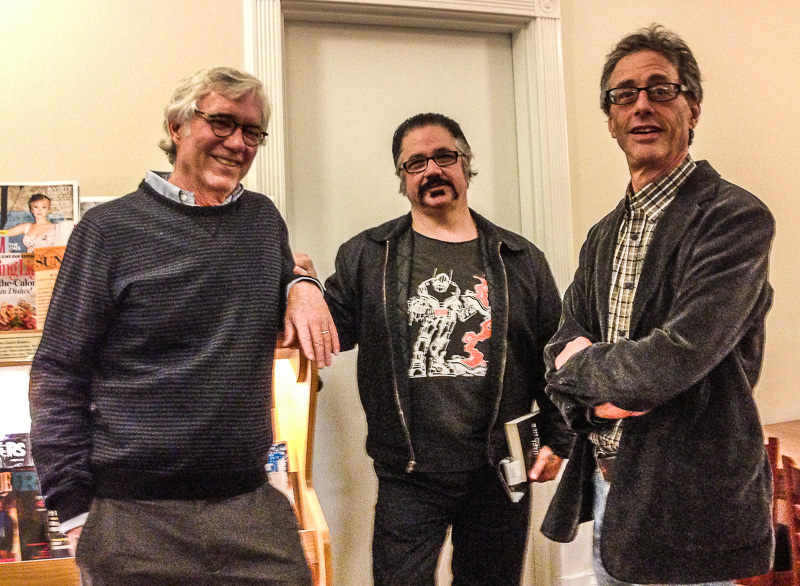
[Rudy, Richard Kadrey, and Michael Blumlein at Borderlands in 2004]
Looking back, he could see how the vegetation thickened in lush green clumps where the water and light came down. And the idea grabbed him that this is what the future looks like. All the wild green things that survive our big binge will move in to tear down what we leave behind after we’re gone, and in a generation the concrete and steel will be covered in new life.
Love the Ballardian victory of the plants. Very Richard Kadrey too, back in his early Kamikaze L’Amour vein. And Bill Burroughs in the Amazon, looking to score some yage. Nature always gets the last word. Such a relief to know that deep down. As Chris indeed does…he actually lives on a renaturalized brownfield. As he in effect says in Tropic, “You just have to leave it alone. It’ll come back.”
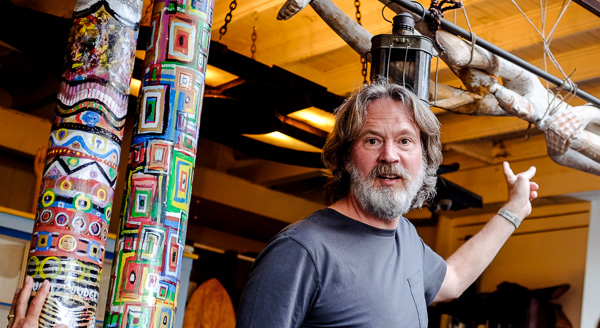
“The people are crazy,” said Tania. “Manipulated by political marketers into a rabid toddler mob that feeds the President and his oligarchs.” “That’s true, too,” said Claude. “But what if we implanted our own virus? Watch and see.”
The artists’ dream: we can counterprogram the media. Jam it. It has been done. It’s never at all clear what’s gonna work. But we have to try. The guy in this picture, Eric Lyons, was my boss when I was a programmer at Autodesk in the 1990s. Working on Cellular Automata, Chaos, and Artificial Life. Getting out the word. Bringing Cyberpunk to Silicon Valley. Eric was the most admirable boss I ever had. A pal. And you wanted to do what he said. A regular-guy engineer Viking freak. And our big boss was…Walker. John Walker, king of the computer hackers. Walker just released a new runs-in-any-browser-on-any-machine version of our old CA Lab / Cellab / WebCA program. Dig it here. Beyond wow.
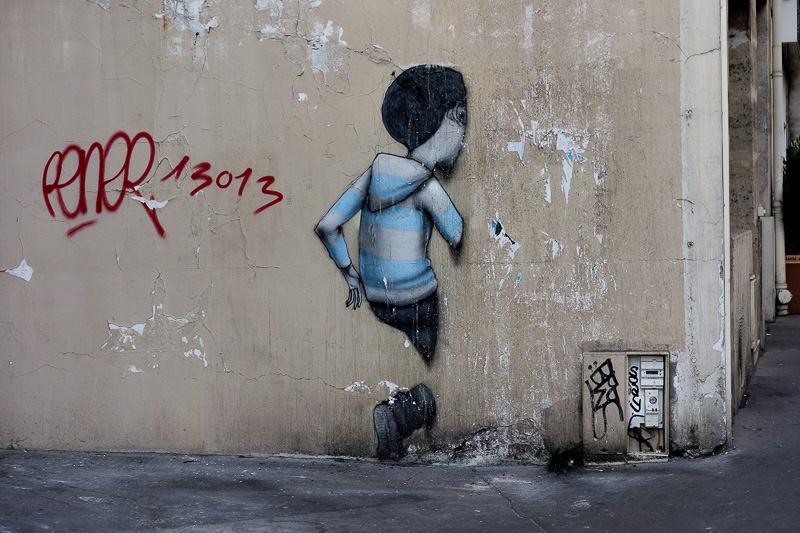
They followed an imaginary line through American mapspace they appropriated from the old fictions of Maxine Price. The original Tropic of Kansas. Walker said it was the line in our heads “where ingenuity runs into loco.” To Tania, it was about riding on the cresting wave of the revolutionary impetus—the same energy that fuels a rock band, or a start-up, or a new religion, or a new American idea—before it gets co-opted by peddlers and power trippers.
The evanescent magic. Tropic of Kansas is, in a way, like a tale about a rock band getting big. Sig and Tania can’t fail. A power fantasy. A rush to read. Dying and being reborn over and over. Our time will come.

It didn’t take much to light the fire in people covered in petrochemicals by the kleptocracy and told it was actually freedom.
Funny how even the New York Times calls our President a kleptocrat by now. It’s not a catchphrase. It’s a fact.
It’s good to see fellow SF writers step forward to help raise the nation’s consciousness lest Trump be reelected in 2020. It’s our civic duty, you could say. But, of course, I rebel at any concept of “civic duty.” In a way, it’s equally important to create transcendent liberating escape literature. Well, really it comes down to whatever I’m actually able to write at any given time…

[Paul Mavrides with his black velvet painting of the Challenger disaster.]
[The attack machine was a] primitive robotic simulation of the musculoskeletal locomotion of a four-legged mammal. Its head came up on a strange coiled stalk, electronic eyes wrapped in a lidless white helm of bulletproof metal. It looked blind by the standards of nature, but you could see it was watching everything, assembling a complex model of the immediate tactical situation in the silicon brain that rode on top of its atomic heart. The beast had a patchwork exoskeleton of polished metal plate, mostly white but with a few off-color panels of red and black. Its call sign was a machine code laser-etched on its left rear haunch. It had a black box where the flag should have been.
I remember Robert Sheckley writing about machines like this. Chris likes to keep doing that trick of putting his characters into impossible situations…and then getting them out of it. At one point he even uses the Sheckley trick of going into the robot’s cuts via an access panel on it’s bottom. If you’re a writer, there’s always a way out.
And in conversation, Chris even speaks of his characters Sig and Tania as being superheroes. It is in some sense impossible to kill them. It helps that Chris Brown is the divine creator of the universe that Sig and Tania live in. In another of his essays, Chris makes the point that our novelistic characters are often in fact avatars of folktale heroes.

When they flipped the switch, it popped a flash against the back of everyone’s eyeballs. All the lights went out from Fort Meade halfway to Richmond, and drones fell from the sky like big metal doves.
The trope of the humble superweapon made in a garage. This one’s called the “Flashlight.” And yea, verily, the evil drones drop from the heavens.

And a new flag fluttered from the roof, the one that was made of a million stars to represent the idea of the Crowdrule.
Happy ending? Well, for about a minute. As Chris wrote to me in an email, “Imagining revolution is fun, and an easy place to find good story, but imagining what comes after is a lot harder.”
In Tropic of Kansas, after the new American revolution, the foreign countries come pushing in to “help” us. Naomi Klein The Shock Doctrine anyone? But, gosh, I never thought it’d happen to us! Oh, well. There’s still time, sister and brother. Maybe.

The dance continues. Dys / Eu. I like to focus on the funky interstitial slash. S/F knows all. With books like Walkaway and Tropic of Kansas out in the mindscape, we can still win this thing.









































